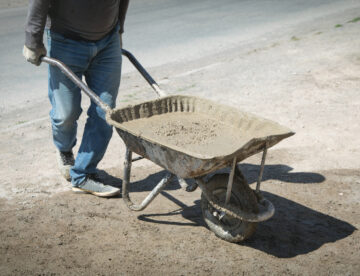
When project deadlines are looming, allowing periods of overtime can be helpful in ensuring everything is completed on time. However, excessive reliance on overtime during any phase of construction can be a telltale sign that something might have gone wrong at the initial planning stage.
So, the question is ‘How can a construction business effectively reduce its reliance on overtime and ensure smoother, more efficient operations?’ Read this week’ blog to explore this subject in more detail.

According to the Health and Safety Executive (HSE), over 1.2 million working days are lost in the UK because of injuries caused during manual handling tasks in the construction industry.
Aside from the economic impact, such injuries can be painful and have long-term, serious consequences – particularly those involving back problems like slipped discs and repetitive strain injuries. At Sheriff Construction, our site workers undertake mandatory training in this area but we thought we’d use this week’s blog as a reminder of why this is such a backbone of safety in construction and pass on a few general ‘DOs’ and ‘DON’Ts’.

A new NVQ for Brickwork Technicians has just been launched by the Association of Brickwork Contractors.
With building safety compliance in mind, the qualification has been designed for the thousands of people who work within the brickwork industry on important tasks that support the bricklaying process (but who are not actually bricklayers). Find out more here.

Research suggests that the average British construction worker consumes more than 4000 calories a day. That’s 1500 calories above the recommended daily intake for men and 2000 more than what’s recommended for women.
While the daily toll of physical labour means construction workers probably do need more fuel than the average person, the problem is that they’re often choosing unhealthy fast-food options which do not provide the best energy boost and have long-term health implications. Find out more in this week’s blog which includes some healthy alternatives for your key fuelling up times – breakfast and lunch.

With tools and equipment in almost constant use, a construction site is generally a noisy environment.
Aside from the potential for this to cause nuisance to neighbouring communities, frequent exposure to raised noise levels can have serious consequences for workers, causing problems like tinnitus (a sensation of ringing in the ears) and hearing loss.
Find out more, including how to protect yourself from these risks in this week’s blog.

Schools and colleges have broken up and, aside from the unpredictable weather, this means lots of young people will now be nervously waiting for their exam results and preparing for the next stage of their life.
While some will know exactly what they want to do, others might still be considering the options. For anyone considering a career in construction but not knowing where to start, we’ve got three steps you could follow in this week’s blog.

Following repeated calls from leaders within the construction industry, the Home Office has finally announced it is easing visa restrictions for brickies, roofers and chippies from overseas by adding them to the UK’s Shortage Occupation List (SOL).
This list is designed to help sectors where employers are struggling to fill vacancies and the move to include more construction trades has been welcomed by the Construction Leadership Council as a solution to addressing immediate skills shortages in the UK. Find out more in this week’s quick-read blog.

Today marks the 75th anniversary of the NHS, known worldwide as one of the first and best healthcare systems to be universally available and free at the point of delivery.
Unfortunately, while its principles are unshaken, the NHS today is under pressure due to several issues – staff shortages, backlogs from Covid and industrial action to name a few.
Is there anything the construction sector can do to help? The answer actually is ‘yes’. Construction is high-risk industry for both injuries and health issues, but focusing on preventative measures can reduce those risks (consequently reducing some of the pressure on the NHS). Read on to find out more.

Today (20th June) is World Refugee Day, a moment when people are invited to not only consider the plight and dismal conditions faced by millions of refugees around the world, but also to celebrate the strength and courage of people who have been forced to flee their home countries to escape disaster, conflict or persecution.
Offering the tagline ‘Hope away from Home. A world where refugees are always included’, this year’s theme made us wonder what the inclusion of refugees has meant for the UK in general and how it might work within industries like construction. Read this week’s blog to find out more.
